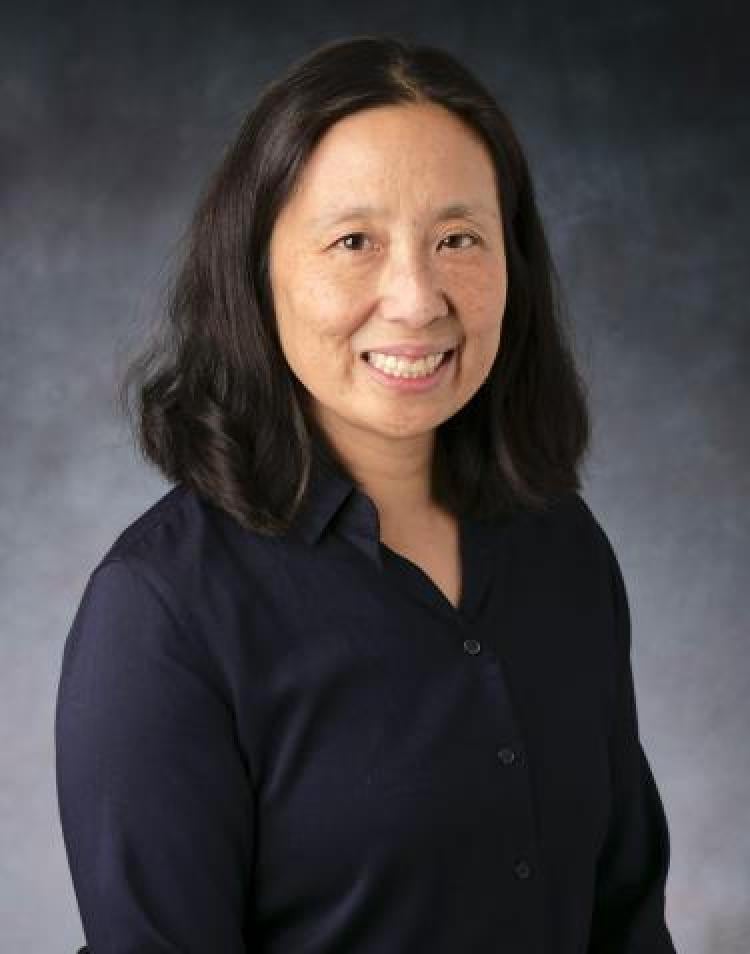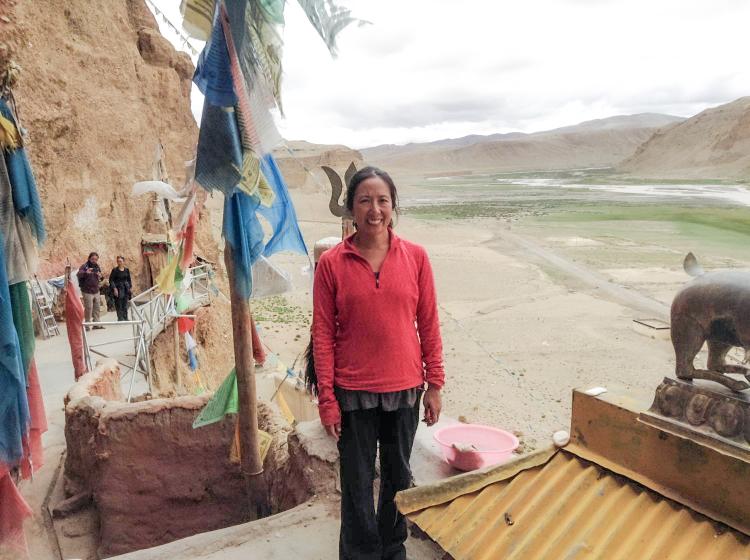Emily Yeh named Phi Beta Kappa Visiting Scholar
CU Boulder geography professor to visit other campuses, join classroom lectures and seminars and give major lectures open to the host campus’ community
Emily Yeh, professor of geography at the University of Colorado Boulder, has been named a Phi Beta Kappa Visiting Scholar for 2023-24, the academic honor society has announced.
Yeh is among 14 scholars nationwide to win this recognition. As a visiting scholar, Yeh will visit universities and colleges where Phi Beta Kappa chapters are located. Visiting Scholars spend two days on each campus meeting informally with undergraduates, participating in classroom lectures and seminars, and giving one major lecture open to the academic community and public.
Yeh conducts research on nature-society relations and development, mostly in Tibetan parts of the People’s Republic of China. She has written about the political ecology of pastoralism, conflicts over access to natural resources, vulnerability to and knowledge of climate change, the cultural and ontological politics of nature conservation, and the conjunctural production of environmental subjectivities.

Emily Yeh's main research interests are on questions of power, political economy, and cultural politics in the nature-society relationship.
Her book Taming Tibet: Landscape Transformation and the Gift of Chinese Development explored the intersection of political economy and cultural politics of development as a project of state territorialization.
She is also co-editor of Mapping Shangrila: Contested Landscapes in the Sino-Tibetan Borderlands and of Rural Politics in Contemporary China, and author of more than 55 articles and chapters.
She regularly teaches classes on political ecology, development, environment and society geography, contemporary China and research design. She served as president of the American Association of Geographers in 2021-22.
Yeh recently answered five questions about her scholarship and research. The exchange appears below:
Question: You hold degrees in electrical engineering and computer science and in technology and policy from MIT, in addition to your PhD from the UC-Berkeley Energy and Resources Group: How does this academic training affect your research and scholarly work in geography?
Yeh: I was a math and science kid all the way through high school, which led me to study electrical engineering. What I do now is very different, but I think it gives me an appreciation for the interdisciplinarity of geography.
As an undergraduate, I enjoyed my coursework but realized after a summer internship in engineering that I wanted to do something that was more directly engaged with society and my growing interest in the environment. The Technology and Policy program attracted a lot of students like me—people who had studied engineering or physics but wanted to do something more policy and society oriented.
It gave a lot of freedom on coursework, and I took a class on Development and Underdevelopment in the Third World in the Department of Urban Studies and Planning from a geographer (Jesse Ribot) who had done his PhD at the Energy and Resources Group.
I realized immediately that this was the type of work I wanted to pursue, so I applied to ERG as well. That was also an interdisciplinary program that had begun in the 1970s focused on energy but which, at the time I was there, attracted students who wanted to work broadly on a range of human-environment issues.
I took classes in the geography department (as well as a lot of other departments) while there. A number of graduates have gone on to be geography professors—so my training there in political ecology and development geography is very much directly related to my current scholarship.
Q: You are an expert on the Tibetan Plateau, China and the Himalayas, where you conduct ethnographic research. What drew you to this disciplinary focus?
Yeh: My focus on Tibet was quite accidental. After I graduated from college with an engineering degree in 1993, my parents—who were born in China and grew up in Taiwan—sent me to Beijing University to study Chinese for the summer. While there, I met a couple of Japanese tourists over a weekend trip to Inner Mongolia who suggested we go to Xinjiang together.
However, there was flooding at the time, and we couldn’t get tickets. They suggested Tibet instead. That was during a brief window when entry permits weren’t necessary, and we were able to just buy plane tickets easily. I spent a week in Lhasa and Shigatse and was awestruck by the cultural landscape, as well as the majestic physical landscape, both of which were so different from anything I had seen before. That’s what sparked my initial interest in Tibet. Later, after my MS degree, I worked in Beijing for a year on sustainable development and was able to travel to Tibet again. I knew that I wanted to work on environment and development issues and had Chinese language skills, but also didn’t really enjoy living in Beijing.

Emily Yeh visiting Tibet.
When I was at the Energy and Resources Group at UC Berkeley, I was able to secure a FLAS (Foreign Language & Area Studies) fellowship, which I used to study Tibetan in Lhasa for a year, which was an amazing and fascinating experience. I really fell in love with Tibetan culture and still find the Barkhor, a warren of shops and streets around the Jokhang Temple at the center of Lhasa, one of my favorite places in the world.
Q: Last year, you spoke during a Coloradan Conversations event focused on climate change and human rights; there, you made a case that the people most affected by climate change, such as Tibetan pastoralists, have the fewest resources to adapt to it and that, therefore, wealthier nations that are culpable for climate change should pay for this adaptation. Do you see any significant signs that such recompense is likely to occur?
Yeh: Italian theorist Antonio Gramsci famously used the phrase “pessimism of the intellect, optimism of the will,” which I think is relevant here. The promise of a Loss and Damage Fund at COP27 in Sharm-el Sheikh was a long-sought-after and important step in the right direction at the national scale, but there are still many things that need to happen for the fund to come to fruition.
Many questions remain, too, about whether the scale of eventual funding will come anywhere close to the scale of need. There are also no guarantees that the funds will be directed within countries to the most vulnerable. For example, Tibetan pastoralists live in China, a country that would not be a recipient of any Loss & Damage Funds (indeed some countries would like China to pay into the fund).
Nevertheless, “optimism of the will” means that we need to consistently work toward realizing visions of justice, even if they seem beyond grasp.
Q: If a group of middle-school students were to ask you why they should consider post-secondary studies in geography, how would you respond?
Yeh: I’d tell them: Geography is so much more than what you might think! A lot of the most important issues you hear about in the news—geopolitical conflict (for example, the war in Ukraine), borders and international migration, the effects of increasing wildfire on human health, the effects of climate change on melting ice sheets, on conflict, on disasters, the spatial patterns of the spread of pandemics, the declining snowpack in Colorado and its effects on vegetation, indigenous territory and human rights, the politics of nature conservation—just to name a few, are all things that geographers study.
Geography is so much more than what you might think! A lot of the most important issues you hear about in the news—geopolitical conflict (for example, the war in Ukraine), borders and international migration ... —just to name a few, are all things that geographers study.
We also use geospatial technologies, developed by geographers, every day in our smartphone apps. Many students these days are interested in a lot of different topics and thinking about them in an interdisciplinary way—which is exactly what geography does. It’s holistic and often referred to as the original interdisciplinary discipline. It’s about humans and the environment, and also about how different places got to be the way they are.
To get a sense of all the things geographers do, we can also think about the four geographers who were recently elected to the American Academy of Arts and Sciences. Dawn Wright is the chief scientist of the Esri (Environmental Systems Research Institute), which makes popular GIS products. She played a leading role in creating the first GIS data model for the ocean floor.
Marilyn Raphael does research on climate change and variability in the high-latitude southern hemisphere and the interaction between Antarctic sea ice and the atmosphere. Marshall Shepherd works on remote sensing and climate and is the host of the Weather Channel’s Sunday talk show, Weather Geeks. Finally, Ruth Wilson Gilmore is a pioneer in the study of racial capitalism and the mass incarceration in the U.S.
Q: What reaction do you have to being named a Phi Beta Kappa Visiting Scholar?
Yeh: It was a complete surprise to be selected! I’m really honored and very much looking forward to all of the campus visits. It’s wonderful to have this opportunity to meet with students at different colleges and universities and share some of my research.

